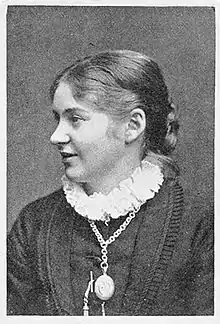Nordic sexual morality debate
The Nordic sexual morality debate (Danish: sædelighedsfejden, Swedish: sedlighetsdebatten, Norwegian: sedelighetsdebatten) was the name for a cultural movement and public debate in Scandinavia taking place in the 1880s, in which sexuality and sexual morals , particularly the contemporary sexual double standard, were discussed in newspapers, magazines, books and theatrical plays.

Background topic of the debate
The topic was criticism of the contemporary sexual double standards prevalent in the 19th-century, in which it was socially acceptable for men to have premarital sexual experience, while women were expected to be virgins. Connected to this was the contemporary view on prostitution, which was sanctioned as a "necessary evil" because of this double standard, since men were expected to have sexual experience prior to marriage, in parallel to the fact that extramarial sex was socially banned for unmarried women. This was an issue that was raised by anti prostitution organizations, such as the Svenska Federationen in Sweden, Finska Federationen in Finland, and Foreningen imod Lovbeskyttelse for Usædelighed in Denmark.
Views
The debate was divided in two sides.
Moderate view
The moderate one side, where Bjørnstjerne Bjørnson was the most known representative, wished to solve this double standard by demanding that men also be virgins on their wedding night, just as women were.[1] This was more accepted one.
Radical view
The more radical one side, where Edvard Brandes and Georg Brandes were the most known representatives, demanded that women be free to enjoy a sexual life prior to marriage, as men were.[2] This was a very controversial view in the 19th-century.
Cultural works associated with the 1880s debate
Getting Married by August Strindberg and the legal court case that surrounded it was one of the perhaps most known incidents during the debate.
It also caused a debate within the literary world whether literature should touch these questions at all. Other well-known works in the debate are Henrik Ibsen's play A Doll's House (Et Dukkehjem), the novel Money (Pengar) by Viktoria Benedictsson, and the novel Pyrhussegrar by Stella Kleve.
See also
References
- Franka Gebert, Den stora nordiska sedlighetsdebatten, Riksteatern, 2008. PDF.
- Franka Gebert, Den stora nordiska sedlighetsdebatten, Riksteatern, 2008. PDF.
Sources
- Franka Gebert, Den stora nordiska sedlighetsdebatten, Riksteatern, 2008. PDF.
- Nationalencyklopedin: "Sedlighetsdebatten" (subscription required)